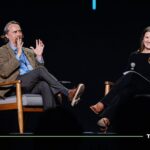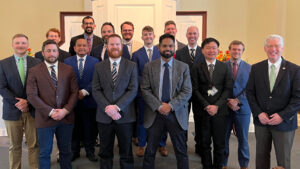I’m a book lover. I have been for as long as I can remember. By the time eBooks made their appearance on the timeline of my life, I was far too addicted to the comforting weight and smell of a physical book to shift my habits to a digital reader, but I’m not a snob about it. More ways to read seems like a hopeful thing.
There’s nothing quite like the feeling of finishing a really good book. The best books leave us changed by the messages they impart, pulling us in from their opening pages, unfolding and adorning their themes, leaving us grateful and moved as we trace their final words. We know this is true of a classic penned by a human author, but it’s also true of the individual books that compose our Bibles. Each one is a treasure trove, yielding up its gifts according to its genre and context. These books, too, cry out to be read from beginning to end, unfolding and adorning their themes from first to final word. Yet we rarely study them on those terms.
Another Way to Study
That’s why I write Bible studies the way that I do. Most of what Christians think of as Bible study today is topical in nature. The author chooses a topic, like contentment or womanhood, and then creates a study that pulls passages from all over the Bible to illuminate that particular topic. That’s a worthwhile way to study. The difficulty arises when it becomes the only way we study. In my experience, particularly with resources created for women, topical studies form the lion’s share of our approach to Scripture in the modern church. As a career book lover, I think that’s a problem.
When we only study topically, we give up the richness of context. We forego tracing the full arc of a biblical author’s argument or narrative, choosing instead to take the parts we (or our study’s author) deem most useful and to leave the rest for “later.” That “later” is usually some vague future date at which we hope to find more time or feel more capable to deal with the deeper study needed to walk through an entire book of the Bible from start to finish.
Freedom from Start to Finish
I know how intimidating it can be to tackle a whole book of the Bible. And as a woman who wears the hats of wife, mother, daughter, sister, employee, and friend, I also know a thing or two about that sparkling unicorn we call “later.” But I also believe that, in this matter, there’s no time like the present. So I write studies to help women who are wives, mothers, daughters, sisters, employees, friends, and perpetual unicorn-chasers to begin savoring a book of the Bible the way it’s intended to be read: start to finish, hanging on every word.
So much freedom is found in this approach to Scripture. Rather than deciding which topic we should arrange verses around, we simply sit back and let the text introduce the topic to be explored. Rather than wonder where to start, we simply start in the text where we left off the day before. Rather than rely on someone to give us the context for passages curated from across 66 books, we carefully learn the context for one book and then apply it across each chapter and verse that book contains. But perhaps most freeing of all is that we build a foundational, firsthand understanding of Scripture that’s essential to benefiting from any topical study we might undertake “later.”
Awakening a Desire
These freedoms do come with some extra effort, but I hope I can ease your attempts by equipping you with some basic tools for mining the text. That is the purpose behind my new study of 1 Peter, which LifeWay will release tomorrow (January 1). It’s a nine-week study that explores the five chapters of Peter’s letter to the early Christian church, a letter filled with encouragement to face difficulty and uncertainty as those whose hope transcends their daily circumstances, as those looking toward a “later” that’s no fanciful unicorn, but rather the glorious and certain consummation of the kingdom.
My hope is that this study of 1 Peter will awaken in women a desire to begin investing in the good work of “owning” an entire book of the Bible in a way that builds literacy as it nurtures their affections for God. I pray the study method it offers will help them grow in their ability to rightly handle the Word, in both their individual and their corporate interactions with it. And I pray that lingering over 1 Peter will serve as an encouragement to them, just as it did for its original hearers, and just as it has for believers enduring difficulty throughout the centuries—a call to worship and to endure as those whose have been “born again to a living hope . . . to an inheritance that is imperishable, undefiled, and unfading, kept in heaven for you.”
Free eBook by Tim Keller: ‘The Freedom of Self-Forgetfulness’
 Imagine a life where you don’t feel inadequate, easily offended, desperate to prove yourself, or endlessly preoccupied with how you look to others. Imagine relishing, not resenting, the success of others. Living this way isn’t far-fetched. It’s actually guaranteed to believers, as they learn to receive God’s approval, rather than striving to earn it.
Imagine a life where you don’t feel inadequate, easily offended, desperate to prove yourself, or endlessly preoccupied with how you look to others. Imagine relishing, not resenting, the success of others. Living this way isn’t far-fetched. It’s actually guaranteed to believers, as they learn to receive God’s approval, rather than striving to earn it.
In Tim Keller’s short ebook, The Freedom of Self-Forgetfulness: The Path To True Christian Joy, he explains how to overcome the toxic tendencies of our age一not by diluting biblical truth or denying our differences一but by rooting our identity in Christ.
TGC is offering this Keller resource for free, so you can discover the “blessed rest” that only self-forgetfulness brings.


































